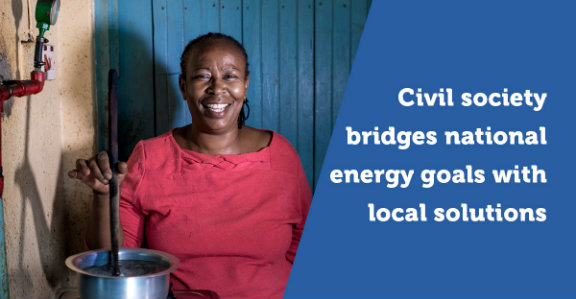Why civil society’s contribution is crucial in ensuring energy access for all
To eradicate poverty and combat climate change we need universal access to clean and affordable energy. This is also included as one of the Sustainable Development Goals (SDG7). However, over the last years energy access has not speeded up but slowed down, especially in rural areas, compared to the period 2010-2012. According to the IEA and Global Tracking Framework** we need to be three times faster and add an additional USD 23 billion each year. Apparently expecting that the private sector will solve it through market-based solutions or that international agreements will automatically translate in changes on the ground, is too easy.
From my perspective, cooperation between all actors – including civil society – is crucial to overcome barriers and ensure that funding really reaches the poor. Intensified cooperation is needed, but what exactly is the role that civil society plays? Below are a few examples of how civil society has contributed.
First of all, CSOs have facilitated broad coalitions, built networks, coordinated and ensured inputs from non-energy sector players as well as from people and women’s groups that are often overlooked in energy debates. For instance, in Indonesia Hivos has initiated the multi-stakeholder process for the island Sumba as icon for 100% renewable energy. It is now helping the government of Indonesia to design supporting policies at national level and work with a range of stakeholders.
CSOs have also played a huge role in translating national energy policies into local solutions, and the other way around, linking needs at local level to the national agenda. In doing so, they have supported governments in delivering inclusive energy policies for all. As in the case of Burkina Faso, where civil society is instrumental in ensuring that (inter)national action plans are included in regional and local agendas.
Thirdly, CSOs support and work in partnerships with governments by providing valuable data, developing better standards and overcoming barriers for investment and inclusive energy implementation. A good example of this work can be found in Indonesia, where civil society has provided specific technical data on wind statistics that was used to shape the wind feed-in tariff proposal on government level.
Lastly, CSOs have enabled financing models to deliver last mile energy solutions. They have done so by lobbying for increased budget for decentralized renewable energy at the national level, and by facilitating new financing mechanisms for implementation at the local level. Civil society has for instance lobbied to safeguard rural energy finance in Nicaragua and made microfinance available for women entrepreneurs.
These examples show that CSOs have been instrumental in improving the policies and investment climate for clean and affordable energy for all. To achieve the ambitious goal of universal access to energy concerted action from all actors – government, private sector and civil society – is required. Multi-stakeholder cooperation will further speed up the result. CSOs are ready to play their part. This means governments, international institutions and private sector should further open their doors for civil society to take its seat at the table so that we can jointly achieve access to clean energy for all.
Read more about civil society’s contribution in ensuring energy access for all in our new publication.
** Global Tracking Framework 2017 and IEA 2011




